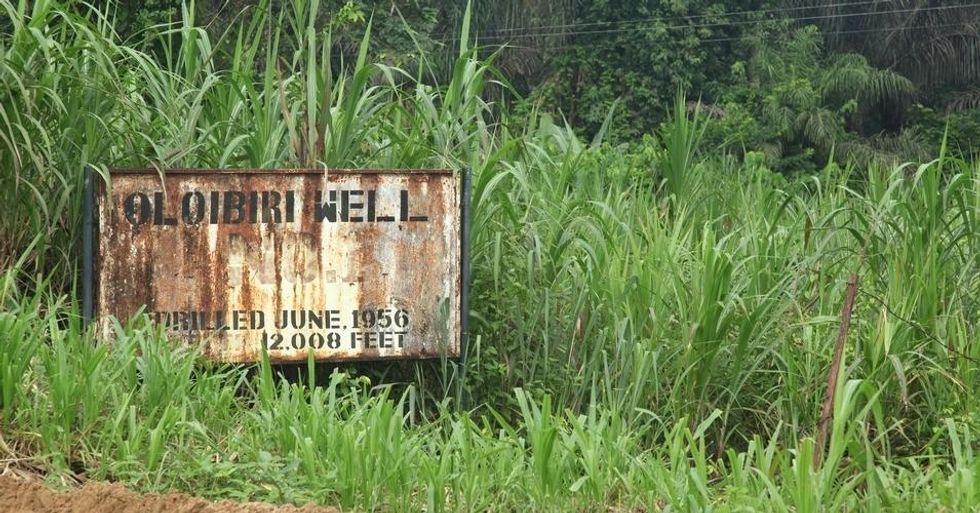Activists in Nigeria gathered at the site of the country's first oil well on Tuesday as part of the global Break Free movement, to show what happens "when the oil goes dry, and the community is left with the pollution and none of the wealth."
Black gold, or oil, was discovered in Oloibiri in 1956 by what was then known as the Shell Darcy corporation--Nigeria's first commercial oil discovery. The site has since been declared a national monument.
But environmentalists like Nnimmo Bassey, a key Break Free organizer and director of Nigeria's Health of Mother Earth Foundation (HOMEF), imbue the oil well with a different sort of significance.
"This is indeed a monument," Bassey said on Tuesday. "This Olibiri Oil Well is a monument to neglect. It is a monument to pollution. It is a monument to destroyed livelihoods and of betrayed hopes. It is a monument to the agents of global warming. It is a monument to fossil colonialism. It is a monumental disappointment. And we are saying, never again!"
Indeed, according to Nigeria's Vanguard Media, which toured the region in March, "The people still face basic development challenges and environmental pollution caused by oil spills."
And this legacy speaks to the common goal of the Break Free movement, which calls for oil, gas, and coal to be kept "in the ground" in order to avert climate and environmental catastrophe.
"The time has come to make fossil fuels history and give our environment and peoples a chance to recover from decades of unrelenting oil pollution," Bassey added in a press statement. "By our actions we are standing in solidarity with communities in the oilfields of the Niger Delta, and other impacted communities around the world, demanding that our appetite for dirty energy must not be allowed to destroy the planet and future generations."
Later this week, the actions in Nigeria will move to Ogoni, "another sad tale of the devastation, internal crises, wanton pollution, and poverty which oil extraction brings," according to HOMEF.
And on Saturday, the Break Free campaign will arrive at Ibeno in Akwa Ibom state where Exxon operates an offshore oil field that "compromises community livelihood through regular pollution," the statement reads.
"This global campaign is the type of citizen-led shock therapy that is needed to make the world realize that our dependence on fossils is destroying our only habitable world," said Ken Henshaw, a member of the Nigeria organizing team of the Break Free campaign and a member of the Nigerian non-profit Social Action.
"Fossil fuels may seem attractive and something we cannot do without," he said, "but so did stone seem just before mankind moved away from the Stone Age; so did typewriters before we moved over to computers. A global dependence on fossil fuel is simply no longer sustainable, especially in the face of increasing threats to global existence on the one hand, and the availability of viable, safer and more sustainable alternatives."
Added local Chief Napoleon Ofiruma at the event on Tuesday: "Today is special because we have the opportunity to speak out to Nigerians and to the world. Today we can say that when we welcomed oil drilling on our land 60 years ago we had a lot of hopes and now we can boldly say that our hopes have been dashed. After 60 years what have we got from oil?"
"The only oil business in Nigeria," he said, "should be the business of cleaning up the oil pollution."




